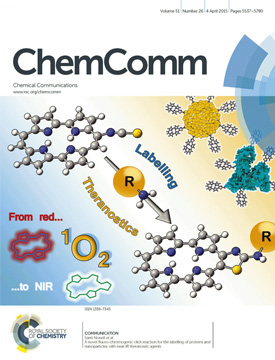IQS-URL, on the cover of the Royal Society of Chemistry's Chemical Communications

Friday, 5 June 2015. A research project by IQS-URL has been featured on the cover of Chemical Communications, one of the most prestigious magazines in the field of multidisciplinary chemistry. This research, developed by the IQS-URL Photochemistry Laboratory, opens the door to diagnosing and treating cancer using infrared light.
The research project, entitled A novel fluoro-chromogenic click reaction for the labelling of proteins and nanoparticles with near-IR theranostic agents, led to the discovery of a new chemical reaction in which a fluorescent probe changes colour when it binds to an antibody and other biomolecules of medical interest, as well as a wide range of nanoparticles.
Labelling antibodies, biomolecules and nanoparticles with fluorescent probes is a technique that is increasingly used in clinical trials and diagnostic imaging. Recently it has begun to be used to guide real-time surgical interventions. One of the main problems with currently available probes is that they emit light in the visible region of the spectrum and thus overlap with the autofluorescence of biological tissues. However, a fraction of the molecules frequently sticks to the surface of the antibody using weak forces, separating from it in the biological medium, with the subsequent loss of specificity.
According to the results published, the fluorogenic probes developed at IQS-URL have resolved these issues thanks to this colour change, which differentiates the probes bound to the antibody from any that may have been separated from it. Moreover, the emission occurs in the near infrared zone, filling a current gap in this zone of the spectrum.
In addition to their unique fluorescent properties, probes bound to the antibody can be activated with light to generate reactive forms of oxygen and cause the death of host cells with high selectivity and efficiency. This dual diagnostic and therapeutic approach gives them great potential as theranostic agents for photoimmunotherapy.
The research was conducted by Dr. Santi Nonell, a lecturer of Physical Chemistry at IQS-URL and an expert on Organic Photochemistry; Dr. Thibault Gallavardin, who provided experience in organic synthesis; and doctorand Oriol Planas, a researcher in training in the area of Physical Chemistry. This multidisciplinary approach, which is inherent to areas of research such as Biological Photochemistry, was a key factor for the success of this research.
The development of light-based technologies is now considered a strategic area of research and one with which IQS-URL is very familiar. The United Nations declared 2015 as the International Year of Light to "promote sustainable development and provide solutions to global challenges in energy, education, agriculture and health". However, the European Union considers photonics to be one of the Key Enabling Technologies along with nanotechnology, biotechnology, advanced materials and nanoelectronics in "A European strategy for Key Enabling Technologies - A bridge to growth and jobs".
Finally, it should be noted that this research is the first to be published in IQS-URL under the "Open Access" system within the Royal Society of Chemistry's Gold for Gold programme. The full text of the paper can be downloaded here.
More information:
Marta Tena
IQS-URL Director of Communications
Tel. 932 672 000 | marta.tena@iqs.edu
www.iqs.url.edu
You may also be interested in


Esade’s program cements its spot in the world’s top 10 for the second year running and stands out in Europe for salary percentage increase, carbon footprint reduction and classroom diversity



